Class 6 Exam > Class 6 Notes > Mathematics Class 6 ICSE > Revision Notes: Playing with Numbers
Revision Notes: Playing with Numbers | Mathematics Class 6 ICSE PDF Download
Factors and Multiples
- A factor of a number is an exact divisor of that number. 6 = 1 x 6 = 2 x 3: factors of 6 are 1, 2, 3 and 6
- Every number is a factor of itself, and 1 is a factor of every number
- Every factor of a number is less than or equal to the given number
- Every number is a multiple of each of its factors. Factors of 12 are 1, 2, 3, 4, 6 and 12 : 3 x 4 = 12, 2 x 6 = 12, 12 x 1 = 12
- Every multiple of a given number is greater than or equal to that number.
- Every number is a multiple of itself
- Factors of a given number are finite, while its multiples are infinite
- If two given numbers are divisible by a number, then their sum (or difference) is also divisible by that number: 6 is divisible by 3, and 18 is divisible by 3. Hence 24 (= 18 + 6) and 12 (= 18 - 6) are also divisible by 3
- A number for which the sum of all its factors is equal to twice the number is called a perfect number:
Ex. 6 and 28
Prime and Composite Numbers
- A number having only 2 factors, namely 1 and the number itself, is a prime number: 2, 3, 5, 7, 11, etc.
- Numbers that have more than two factors are called composite numbers: 4, 6, 8, 9, 10, 12, etc.
- Number 1 is neither prime nor composite.
- The number 2 is the smallest prime number and is even. Every prime number other than 2 is odd.
- Two numbers with only 1 as a common factor are called co-prime numbers: 15 and 16, 8 and 9, 25 and 3,3, etc.
- If a number is divisible by another number, then it is divisible by each of the factors of that number. 24 is divisible by 8: it is also divisible by 2 and 4, which are factors of 8.
- A number divisible by two co-prime numbers is also divisible by their product. 8 and 9 are co-primes, and 8 x 9 = 72
144 is divisible 9 : 9 x 16 = 144 , 144 is divisible by 8 : 8 x 18 = 144
144 is also divisible by 72 (product of 8 and 9) : 72 x 2 = 144
Test of divisibility
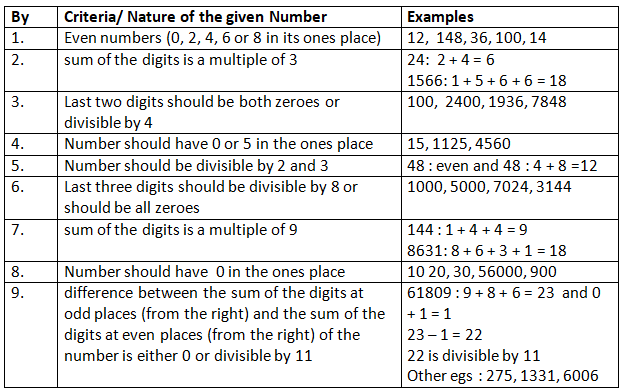
Prime factorization
Expressing a number as a product of its prime factors
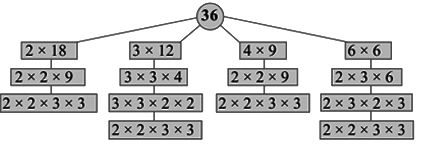
The prime factorisation of 36 is = 2 × 2 × 3 × 3. i.e. the only prime factorisation of 36.
The Highest Common Factor(HCF)
- The HCF of two or more given numbers is the highest (or greatest) of their common factors.
- It is also known as the Greatest Common Divisor (GCD)

20 = 2 x 2 x 5
28 = 2 x 2 x 7
The common factors of 20 and 28 are 2, 2
Hence HCF (20, 28) = 2 x 2 = 4
Steps to Find the HCF of Three or More Numbers
- Find the HCF of any two numbers among the given numbers
- Find the HCF of the third number and the HCF obtained in the previous step
- The last HCF will be the HCF of all given numbers.
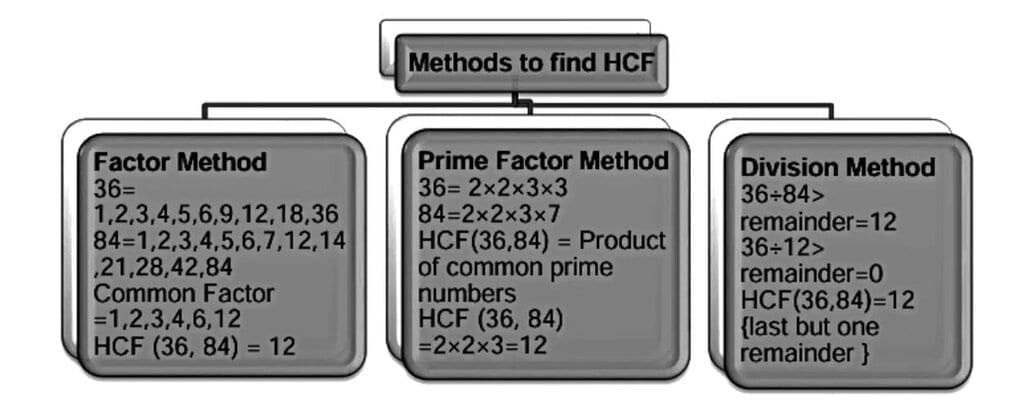
The Lowest Common Multiple (LCM)
- Multiple: When a number divides another number completely, the second number is called a multiple of the first number
- Common Multiple: A number which can be divided completely by the given two or more numbers is called their common multiple.
- For any two coprime numbers, their LCM is equal to their product.
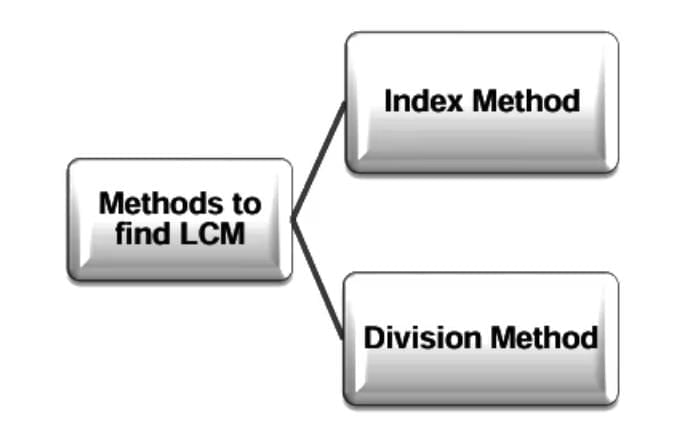
Index Method
- 12 = 2×2×2×3 = 23 × 3;
- 36 = 2×2×3×3 = 22 × 32;
- 40 = 2×2×2×5 = 23 × 5
- LCM = 23 × 32 × 5 = 360
Division Method
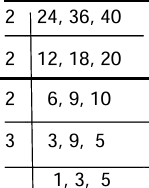
- In this prime factorisation, the maximum number of times the prime factor 2 occurs is three
- Similarly, the maximum number of times the prime factor 3 occurs is two
- The prime factor 5 occurs only once
- Thus, LCM = (2 × 2 × 2) × (3 × 3) × 5 = 360
For any two numbers, the product of their LCM and HCF is equal to product of the numbers.
The document Revision Notes: Playing with Numbers | Mathematics Class 6 ICSE is a part of the Class 6 Course Mathematics Class 6 ICSE.
All you need of Class 6 at this link: Class 6
|
44 videos|201 docs|24 tests
|
FAQs on Revision Notes: Playing with Numbers - Mathematics Class 6 ICSE
| 1. What is the importance of numbers in our daily life? |  |
Ans. Numbers play a crucial role in our daily life as they are used in various aspects such as timekeeping, budgeting, measuring distances, and cooking. They help us quantify and make sense of the world around us, allowing us to make informed decisions and perform everyday tasks efficiently.
| 2. How can I teach my child the concept of numbers effectively? |  |
Ans. To teach your child the concept of numbers effectively, you can use visual aids like number charts, counting games, and interactive apps. Incorporating real-life examples, such as counting fruits during grocery shopping or using numbers in cooking, can also help make learning engaging and practical.
| 3. What are some fun activities to help children learn numbers? |  |
Ans. Fun activities to help children learn numbers include number scavenger hunts, where they find items that correspond to specific numbers, or board games that involve counting and strategy. Additionally, arts and crafts that involve creating number-related projects can enhance their understanding while keeping them entertained.
| 4. How can I explain the concept of addition and subtraction using numbers? |  |
Ans. Addition and subtraction can be explained using physical objects like blocks or beads. For addition, you can combine two groups of objects and count the total. For subtraction, you can start with a certain number of objects and remove some, counting how many are left. This hands-on approach makes the concepts clearer and more relatable.
| 5. What are some common mistakes children make when learning about numbers? |  |
Ans. Some common mistakes children make when learning about numbers include misunderstanding the value of place values, confusing the order of operations, and miscounting due to skipping numbers. It’s important to identify these mistakes early on and provide gentle corrections and additional practice to build their confidence in using numbers.
Related Searches
















